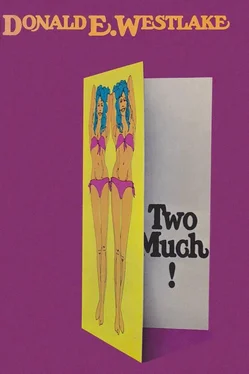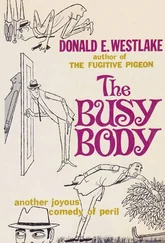How had I ever stood this place? Squalor everywhere. Sitting at my desk, I took out my checkbook and went steadily through the accumulated mail. Some of these people, I thought with amusement, would be quite startled when they received payment in full.
Buzz.
“Yes?”
“Mr. Alworthy.”
“Thank you.” Click. “Gordon?”
“Yes, Art. What can I do for you?” (No secretary delay this time.)
I gave him a backgrounding on the Wonderful Folks negotiations, and he said he’d send a messenger up for the folder and would carry the deal from here. Then I buzzed Gloria, asked her to call my sister, and-return to paying bills till the call came through.
“Doris?”
“My goodness, another phone call. Is this going to happen every month?”
“I’m afraid not, Doris. Basically I’m calling to say goodbye. I’ve—”
“You never even said hello! Fine brother you are. Did you call Duane? You did not. And you prom—”
“Doris, I will never call Duane. I think a Legal Aid attorney would be much more useful to you than I could possibly be.”
“I don’t see why you can’t simply call him and—”
“I’ve sold my business, Doris,” I said, “and I’m going to Europe.”
“You what ?”
“Possibly for a year, possibly longer. I’ve been feeling the need for a change for some time now.”
“But—” A speechless Doris was a rare and beautiful thing. She stammered a bit more, then said, “Europe? Where in Europe?”
“I’m not sure yet. I’ll send you a postcard.”
“You never will,” she said accurately.
“We’ll see. Good-bye, Doris,” I said, and hung up. Then I finished paying the bills and turned to the phone message memos. Wastebasket, wastebasket, wastebasket—
Candy.
I stared at it, her name on the phone memo, and the walls folded in on me. Everybody else had been dealt with, but what about Candy? What story did I have left for her?
Then I noticed the number she’d given, and it was her apartment, Ralph’s apartment. What was all this?
I dialed the number myself, and Candy’s sharp voice promptly answered. “It’s Art,” I said. “Don’t tell me you and Ralph had a reconciliation.”
“Marriage is something you have to work at,” she said. “You wouldn’t know about that, Art.”
“Well, I’m very happy for you both.”
“Ralph and I both agree,” she said, “to just forget the past. You follow me, Art?”
“You mean that letter you gave me?”
“You might think it would be fun some time,” she said, “to send that letter to Ralph. I know the way your mind works.”
She didn’t; I’d long since destroyed the copy she’d given me. But I said nothing, and heard her out.
“You’ve been up to something yourself, you know,” she said.
I held the phone more tightly. “I have?”
“I don’t know exactly what,” she said, “but you’ve been running some kind of confidence racket or something. I think I could make a lot more trouble for you than you could for me.”
No doubt. I said, “Candy, I wish you and Ralph nothing but eternal joy and success.”
“And don’t you forget it,” she said, and broke the connection.
Well. Much relieved, I put down the phone, wrote out a severance check for Gloria, and brought it outside. “This is my last day here,” I told her. “I’m definitely selling the company.”
I was amazed to see her eyes well up with tears, but relieved that none actually fell. She said, “I knew this was coming.”
“Of course you did,” I said soothingly.
“You’ve changed a lot in the last few weeks, Art,” she said. “You may not like me saying this, but it’s that Kerner woman’s money.”
Obviously she hadn’t seen that tiny item about Mrs. Dodge’s demise. “I appreciate your concern for me, Gloria,” I said, “but I think I can take care—”
“Jesus, Art,” she burst out, “what’s the matter with you? You never talked like that before.”
It was possible my intense association with attorneys over the last week had had some temporary influence on my speech patterns. “I’ve never sold a company before,” I pointed out, “nor have I ever fired a good friend and a valued employee.” And I stuck my hand out with the check in it “Severance pay in lieu of notice.”
She took the check, and stood for quite some time looking at it. The tears had receded from her eyes. “Two thousand dollars,” she said softly, and looked up with what might have been an ironic smile. “Well, at least you feel guilty about it.”
“Not at all,” I said. “You have been invaluable here, and I think you know that yourself, and this is really a very small token of my appreciation.”
Squinting as though looking at me through drifting smoke, she said, “Art, won’t you need a secretary wherever you’re going?”
“This company isn’t folding,” I told her. “Why not call that lawyer Mandel, meet with the illustrators? Who knows the business better than you do?”
“You do,” she said.
I smiled at the compliment. “Not any more,” I said.
She hesitated, then turned away, holding the check and shaking her head. “I’ll just finish up this letter here.”
“Take your time.”
“Oh. This came for you.” She turned back with a legal-size white envelope. “I didn’t put it with the business things.”
It was marked Personal , and Linda Ann Margolies’ name and address were in the upper left-hand corner. “Thank you,” I said, and carried the thing back to my office with me.
I very nearly tossed it out at once — something about my brief encounter with that girl bothered me, I couldn’t say what — but curiosity got the upper hand. Opening it, I found a greeting card inside of the kind I used to publish, though not one from my company. The front showed a man in the front half of a horse suit, with a theater’s stage in the background. Inside, it said, “I just can’t go on without you.”
Was that supposed to be funny? I threw it away.












